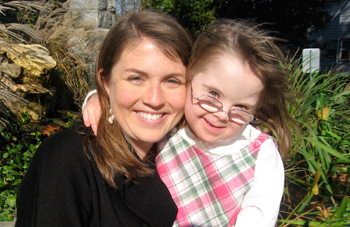You may have heard about a recent court case in which an Oregon couple who gave birth to a daughter with Down syndrome sued their medical center and lab for failing to detect the chromosomal abnormality during the woman’s pregnancy. The couple claim they would have aborted the child if they had known about the diagnosis.
This may seem shocking, but it’s consistent with the fact that 90 percent of women terminate their pregnancies after their unborn children are diagnosed with Down syndrome. There’s a belief that the child will have a poor quality of life, and that the parents will experience an undue burden.
 While it’s true that there are challenges to raising a child with Down syndrome, there’s a whole other side of the story that our wider culture needs to know. That’s why we at The Christophers are happy to recognize the moving and brilliantly written book, “A Good and Perfect Gift,” with a Christopher Award in our ‘Books for Adults’ category this year.
While it’s true that there are challenges to raising a child with Down syndrome, there’s a whole other side of the story that our wider culture needs to know. That’s why we at The Christophers are happy to recognize the moving and brilliantly written book, “A Good and Perfect Gift,” with a Christopher Award in our ‘Books for Adults’ category this year.
Written by Amy Julia Becker, it shares what happened in the two years after she and her husband, Peter, discovered their daughter, Penny, had Down syndrome soon after her birth. The author deserves credit for not sugarcoating her reaction to the diagnosis. She writes, “I could never have imagined the words mental retardation or birth defect being used in the same sentence as my child’s name. It was as if having kids had become an equation: youth plus devotion to God plus education equaled a healthy and normal baby….As if I were entitled to exactly the baby I had imagined, a little version of myself.”
That anxiety, however, was soon followed by normalcy: “[Peter and I] laughed that afternoon, when she wrinkled her forehead in alarm or looked around the room with a mischievous expression. When she was in our arms, it felt like it had when I was pregnant. Simple love. Abundant love. The complications dropped away.”
Worries returned in the ensuing months due to doctor’s appointments and problems with Penny’s heart and ability to hear. That was also the period when the first-time mother bonded with her child, when she came to see her not as a diagnosis, but “as our little girl.”
 As a graduate of Princeton Theological Seminary and a frequent contributor to Christian websites (including Patheos), Becker came to examine her situation from a religious perspective. She used to believe that everything that was wrong in the world, including Down syndrome, was somehow a consequence of original sin. After Down syndrome moved from being an abstract idea to a concrete reality, she questioned her old ideas and wondered how her beautiful little girl could be a mistake in any way. That’s when Becker’s mother spoke a very basic truth, saying, “The only evidence of sin that I see in Penny’s birth is in how we respond to her.”
As a graduate of Princeton Theological Seminary and a frequent contributor to Christian websites (including Patheos), Becker came to examine her situation from a religious perspective. She used to believe that everything that was wrong in the world, including Down syndrome, was somehow a consequence of original sin. After Down syndrome moved from being an abstract idea to a concrete reality, she questioned her old ideas and wondered how her beautiful little girl could be a mistake in any way. That’s when Becker’s mother spoke a very basic truth, saying, “The only evidence of sin that I see in Penny’s birth is in how we respond to her.”
Becker writes, “I don’t know how to think about the fallen-ness of creation…Maybe [Penny’s] body is no less fallen than mine, and I just see it on a continuum that doesn’t exist in God’s economy. I am reminded of Flannery O’Connor’s characters, people as sacraments, visible reminders of God’s grace. Visible brokenness that only helps us understand who we all are—broken yet beloved.”
One of the many strengths of Becker’s writing is that she never adopts a harsh tone of condemnation toward those who have chosen differently than she did. She understands their fears because she’s walked through them herself. What she found is that the perfect love between parent and child opened her heart, and that of her husband as well, to an unexpected and immeasurable amount of joy. Now, Becker wants to help others see that truth, to see the joy and hope that are possible after having a child with Down syndrome. That’s why “A Good and Perfect Gift” is an ideal book for anyone, regardless if they’re pro-life or pro-choice. It’s a heartfelt and enlightening story that could literally save some lives.











